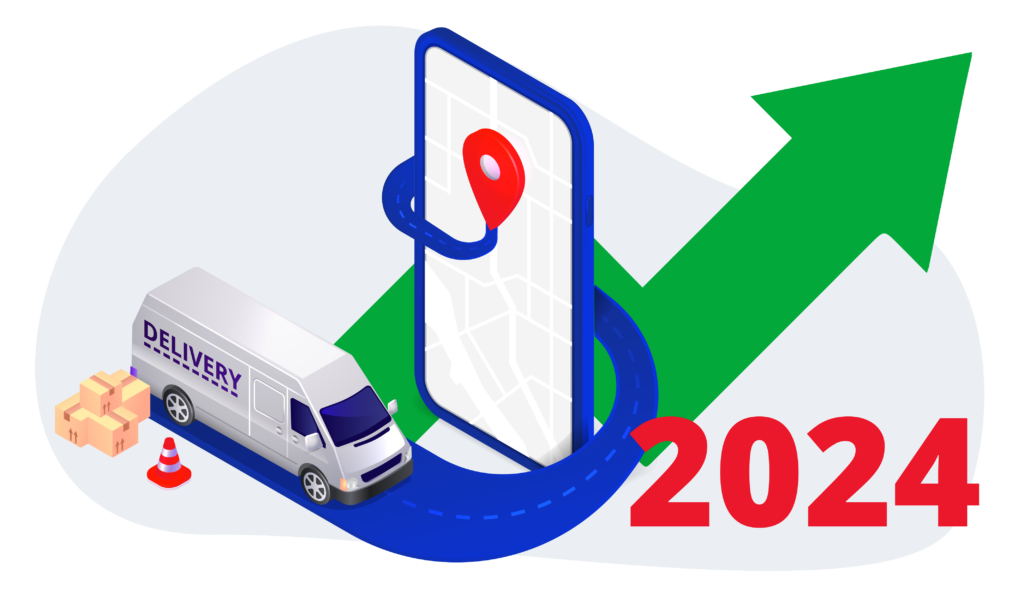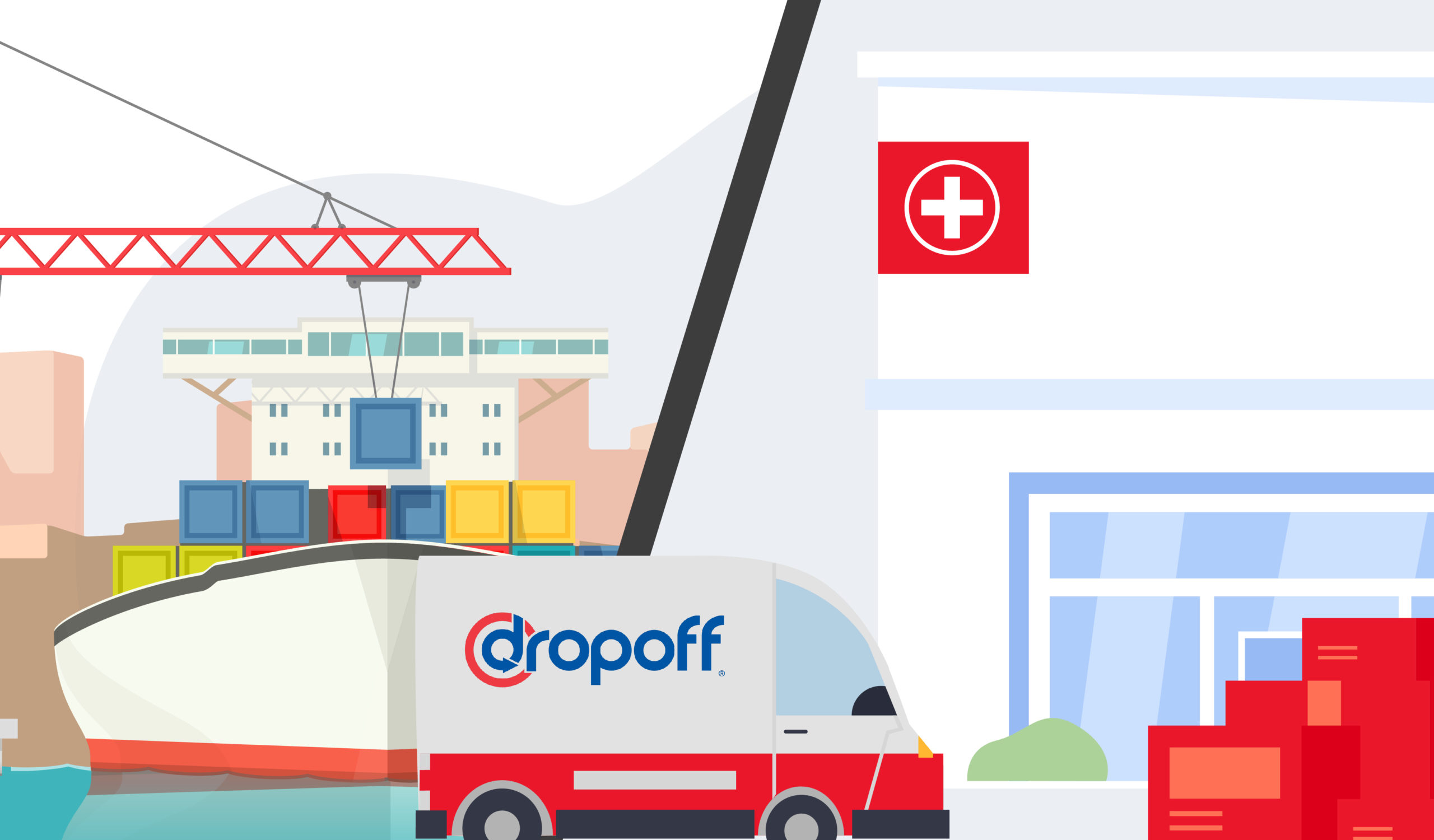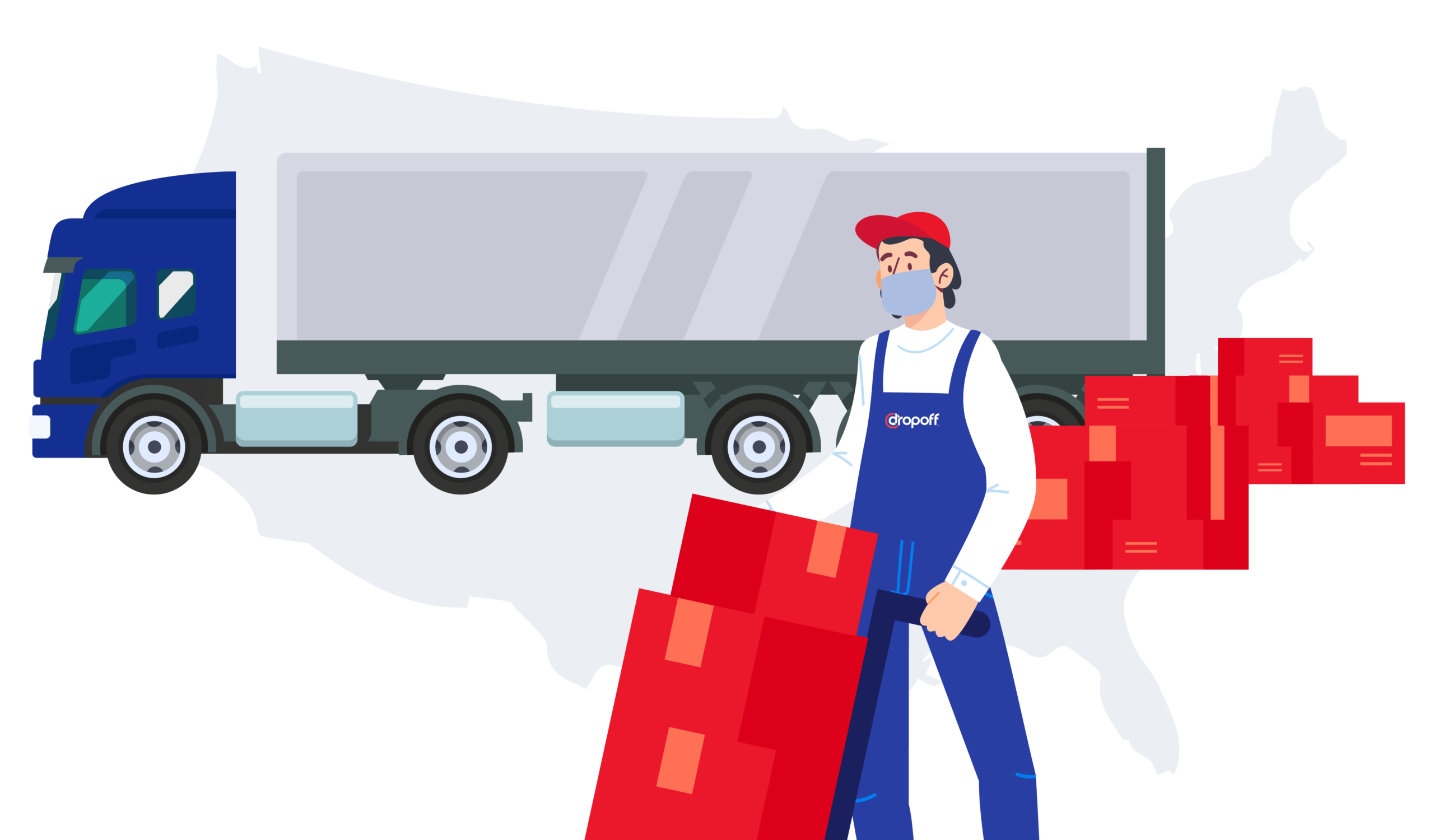Digital Logistics: 10 Trends and Examples To Inspire From in 2024

As commerce becomes increasingly digitized and globalized, the logistics sector is adapting to meet the needs of this rapidly evolving market. This is where digital logistics comes in–a cutting-edge convergence of technology, data analytics, and innovation designed to optimize supply chain operations and exceed customer expectations in an era of unprecedented demand for speed and efficiency.
Digital Logistics Explained in Simple Word
The global digital logistics market size was valued at $28.13 billion in 2023. Furthermore, it is projected to grow from $32.44 billion in 2024 to $120.33 billion by 2032, showing an estimated CAGR of 17.8% during the forecast period.
This is how significant digital logistics has become. But what does it really mean?
According to Koroliova, digital logistics is the digitization of freight transport. It is all about leveraging technology to streamline and optimize the movement of goods from point A to point B.
Digital logistics incorporates intelligent management systems, cargo tracking at all transport stages, unmanned technologies, complete automation of document flow (including electronic goods and transport documents), and swift customs clearance in cross-border traffic. Essentially, it modernizes what was previously a pen-and-paper affair in the logistics process.
The Rise of Digital Logistics
Digital logistics began gaining popularity in the late 20th century with the increasing availability and affordability of digital technologies such as computers, software systems, and data networks. However, it truly took off during the rise of eCommerce and dropshipping, as businesses shifted to purely online operations.
Furthermore, the COVID-19 pandemic also urged brands with physical stores to secure an e-commerce presence, accelerating the need for more efficient, innovative, and agile supply chain management solutions.

Challenges for Digital Logistics in 2024
While digital logistics holds immense promise, it also comes with its fair share of challenges.
1. Cybersecurity Threats
With the increasing digitization of logistics operations, they also become more vulnerable to cyber-attacks. For instance, in May 2023, the USA experienced one of the most extensive cyberattacks when a Chinese hacking group compromised critical communication and transportation infrastructure. This incident raised concerns about the potential degradation or disruption of the Department of Defense (DOD) logistics system.
Similarly, hackers may target supply chain systems to disrupt operations, steal sensitive data, or compromise customer information. Addressing cybersecurity threats demands robust defense mechanisms, regular audits, and continuous monitoring to detect and mitigate potential risks.
2. Data Privacy Concerns
As data collection and analysis become increasingly prevalent in digital logistics, ensuring the privacy and security of both customer and operational data is paramount. In June 2023, KNP Logistics Group, one of the largest UK logistics companies, fell victim to a ransomware attack.
To address these concerns, companies must comply with regulations such as GDPR and CCPA while implementing strict data governance policies. Safeguarding data integrity and preventing unauthorized access or misuse are ongoing challenges that demand constant vigilance.
3. Seamless Technology Integration
Integrating various digital logistics technologies, such as IoT, AI, and blockchain, into existing systems and workflows can be complex and challenging. Compatibility issues, interoperability concerns, and legacy infrastructure constraints may hinder smooth technology integration.
Overcoming these challenges requires careful planning, strategic investments in interoperable solutions, and collaborative partnerships with technology providers.
4. Regulatory Compliance
Compliance with evolving regulatory requirements, both domestically and internationally, poses a challenge for digital logistics operations. Navigating complex regulatory landscapes, managing trade restrictions, and ensuring adherence to customs regulations demand meticulous planning and expertise.
For instance, international laws on freight management are expected to change in 2024 as ocean and air transportation capacity adjusts to more traditional levels.
5. Infrastructure Dependence
Recent surveys indicate that 77% of society relies excessively on technology for success, highlighting an over-dependence on technological systems. Maintaining resilient infrastructure capable of supporting digital logistics operations is crucial for minimizing disruptions and downtime. However, challenges such as aging infrastructure, insufficient IT resources, and vulnerability to natural disasters or cyber attacks can present significant obstacles.
Investing in robust IT infrastructure, implementing redundancy measures, and developing comprehensive disaster recovery plans are essential steps for ensuring business continuity in the event of unforeseen circumstances.

Upskilling the Workforce: An Essential Factor in Implementing Digital Logistics
The adoption of new technologies in digital logistics necessitates a skilled workforce capable of operating and maintaining these systems effectively. However, 40% of logistics companies face challenges in upskilling their employees to keep pace with technological advancements.
Investing in training programs, reskilling initiatives, and talent development strategies is essential to bridge the skills gap and empower employees for success in the digital era. Moreover, ensuring that upskilling initiatives are enjoyable for employees can further enhance their engagement and productivity.

Top 10 Digital Logistics Trends and Tips to Follow
As the logistics industry embraces digital transformation, staying updated on the latest trends is crucial for businesses to remain competitive. Let’s delve into the top 10 trends shaping the future of logistics and discover some fun tips to make the journey even more exciting.
1. Robotics and Autonomous Vehicles
Robotic technologies and autonomous vehicles are revolutionizing warehouse operations, streamlining processes, and enhancing efficiency. While it may sound a bit over the top, it’s worth noting that 88% of companies worldwide are now planning to invest in adding robotics to their operations, including logistics.
Fun Tip: Embrace the robot revolution in your warehouse by giving each robot a name and personality. This humanizes the technology, boosts team morale, and fosters a sense of camaraderie between human workers and their mechanical counterparts. Take Hilton’s robot concierge Connie!
2. Predictive Analytics
Predictive analytics empowers businesses to forecast future demand, predict inventory levels, and identify potential supply chain disruptions. For example, Pepsi’s Sales Intelligence Platform monitors stock levels across all vendors, notifying them in advance of replenishment needs, thereby optimizing the efficiency of the company’s supply chain.
Fun Tip: Channel your inner fortune-teller by organizing a “predictive analytics party” where you make predictions about future demand, inventory levels, and supply chain disruptions. Whoever gets the closest to reality wins a prize!
3. Drone Delivery
Drone delivery presents innovative solutions for faster and more efficient transportation of goods. It is gradually revolutionizing last-mile deliveries for numerous customers, with over 660,000 commercial drone deliveries made to customers, not including the countless test flights.
Fun Tip: Take your drone delivery game to the next level by hosting a “drone racing championship” for your logistics team. Not only does it inject some fun into the workplace, but it also hones their piloting skills and fosters healthy competition.
4. Blockchain Integration
Blockchain integration ensures transparency and traceability in supply chain operations. The technology is so promising that DHL, one of the leading shipping companies in the world, is already working on integrating it into their operations.
Fun Tip: Turn blockchain integration into a treasure hunt by hiding “digital coins” (QR codes) throughout your warehouse. Employees who find them can redeem them for rewards like extra break time or gift cards.
5. Go Green Practices
Implementing sustainable practices in logistics operations is essential for reducing waste and minimizing environmental impact. It has become a vital operational factor for businesses, as 78% of consumers now expect brands to adopt sustainability practices.
Fun Tip: Make sustainability a team effort by organizing regular “green challenges” within your logistics team. Encourage creative ideas and initiatives that reduce waste, conserve energy, and minimize carbon footprint. Recognize and reward individuals or teams who implement the most impactful sustainable practices, fostering a culture of environmental responsibility and innovation throughout your organization.
6. Digital Twins
Digital twins replicate physical assets digitally, offering insights into their performance and behavior. By creating a virtual representation of a physical asset, such as a warehouse or a piece of equipment, digital twins enable businesses to monitor and analyze real-time data.
Fun Tip: Create a digital twin of your warehouse and challenge your team to find hidden “Easter eggs” within the virtual space. It’s a fun way to familiarize them with digital twin technology while promoting teamwork and problem-solving skills.
7. Cloud Technologies
Cloud technologies offer scalable and cost-effective solutions for improving logistics operations. These technologies enable businesses to store and manage vast amounts of data securely, collaborate with partners and stakeholders in real-time, and deploy applications and services quickly and easily.
Cloud technology has become deeply ingrained in numerous industries such as logistics. In fact, businesses argue that there is no “future of cloud” as it has already become inseparable from our daily lives.
Fun Tip: Host a “cloud party” where you invite your team to brainstorm creative ways to leverage cloud technologies for improving logistics operations. Provide snacks and drinks to fuel their creativity, and who knows, you might just stumble upon the next big innovation in logistics!
8. Internet of Things
The Internet of Things (IoT) facilitates real-time tracking and monitoring of goods and assets throughout the supply chain. This continuous stream of information enables logistics companies to optimize routes, predict maintenance needs, improve inventory management, and enhance overall operational efficiency.
Fun Tip: Sprinkle some magic into your IoT implementation by assigning each sensor a “superpower” based on its function. For example, temperature sensors could be “Thermo Titans” and motion sensors could be “Ninja Navigators.” It adds a touch of whimsy to an otherwise technical aspect of logistics.
9. Voice and Pick-to-Light Technologies
Voice and pick-to-light technologies are advanced systems designed to enhance the accuracy and speed of order-picking processes within warehouses. Voice-guided systems utilize spoken instructions delivered through headsets, enabling warehouse workers to receive real-time guidance on item locations and quantities without having to refer to paper lists or handheld devices.
Fun Tip: Turn order picking into a game by setting up a leaderboard that tracks the speed and accuracy of each picker. Offer prizes or incentives for top performers to motivate healthy competition and drive productivity.
10. Augmented Reality (AR)
AR technology enhances training, maintenance, and order-picking processes in warehouses. AR allows workers to visualize complex processes and workflows more intuitively. Instead of relying solely on manuals or classroom instruction, trainees can use AR headsets or devices to interact with virtual objects and simulations, gaining hands-on experience in a simulated environment.
Fun Tip: Host an “AR scavenger hunt” where employees use AR-enabled devices to hunt for virtual treasures hidden throughout the warehouse. It’s a great way to familiarize them with AR technology while injecting some excitement into their daily routines.
Want to learn more about the latest trends and tips in digital logistics? Attend last-mile delivery conferences and events throughout 2024, where industry experts share insights and innovative solutions to enhance your logistics operations and drive business growth.

Why Dropoff Should Be Your Digital Logistics Provider
Dropoff is more than just a logistics provider; we’re your ultimate digital logistics partner. Our commitment to staying ahead of industry trends and technologies ensures that we deliver excellence to our clients consistently.
Our industry-leading same-day delivery services set us apart from the competition. With a focus on safety, speed, and reliability, we guarantee seamless delivery experiences for your packages. Trusted by over 270 global brands, our real-time tracking and image confirmations provide transparency and peace of mind throughout the entire delivery process.
What truly distinguishes Dropoff is our personalized approach to logistics.
Our customizable logistics software is tailored to fit the unique needs of your business, offering efficient and effective solutions. Whether you operate in healthcare, retail, or industrial sectors, our expertise and resources are here to optimize your supply chain and keep your operations running smoothly. With 24/7 customer service always available to address your logistics needs, Dropoff ensures that you have the support necessary to focus on growing your business confidently.
Final Thoughts
Digital logistics represents a transformative solution for the evolving demands of commerce in today’s digitalized and globalized landscape. With its blend of technology, data analytics, and innovation, digital logistics optimizes supply chain operations and exceeds customer expectations for speed and efficiency. Despite challenges such as cybersecurity threats and regulatory complexities, businesses embracing digital logistics stand poised to seize promising opportunities for growth and innovation.
As the ultimate digital logistics partner, Dropoff offers industry-leading services, customizable solutions, and round-the-clock support, empowering businesses to thrive in the digital age while entrusting logistics complexities to expert hands.
Frequently Asked Questions
Digital logistics is the convergence of technology, data analytics, and innovation to optimize supply chain operations in a digitized and globalized marketplace. Businesses must embrace digital logistics to meet the demands for speed, efficiency, and transparency in today’s commerce landscape.
Cybersecurity threats, data privacy concerns, seamless technology integration, regulatory compliance, and infrastructure dependence are among the primary challenges facing digital logistics in 2024. Addressing these challenges requires robust defense mechanisms, strict data governance policies, strategic investments, and compliance with evolving regulations.
Businesses can overcome the challenges of implementing digital logistics by investing in robust cybersecurity measures, adhering to data privacy regulations, strategically integrating technology solutions, ensuring compliance with regulations, and maintaining resilient IT infrastructure. Additionally, upskilling the workforce and fostering a culture of innovation are essential for successful implementation.






